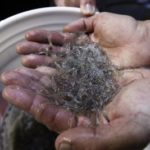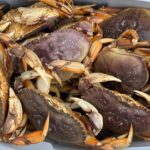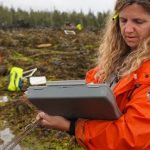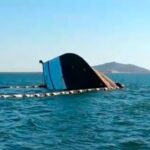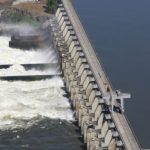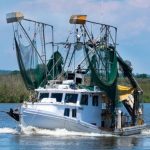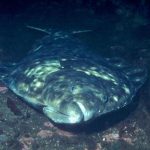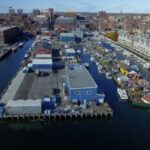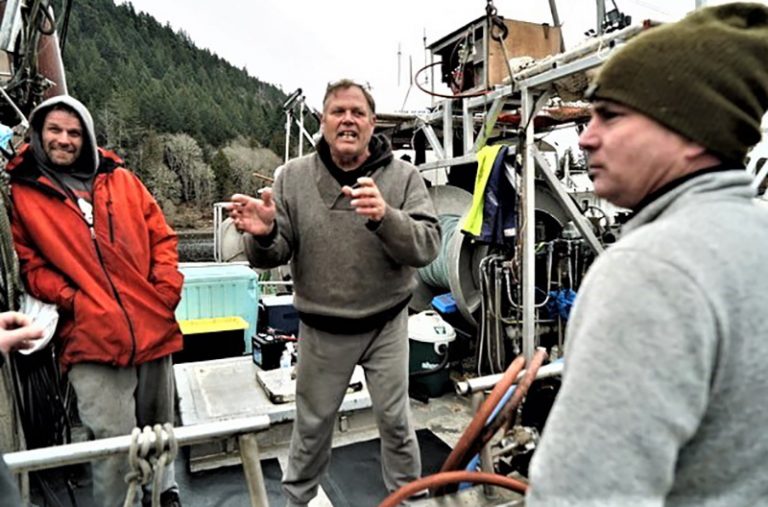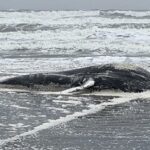Monthly Archives: April 2017
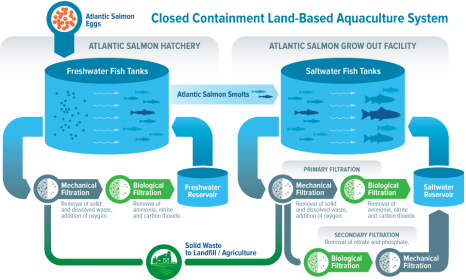
Land Based Fish farm gets cash injection
Ottawa is pumping $1 million into Hants County’s Sustainable Blue’s fish farming operation to boost production of Atlantic salmon and commercialize cutting-edge marine water treatment technology. Federal funding will allow the company to build a 300-metric tonne land-based saltwater grow-out facility, which will bring its total capacity to 500 metric tonnes. This will allow production of Atlantic salmon year-round. In making the announcement, Kings-Hants MP Scott Brison said the money from the Atlantic Canada Opportunities Agency will benefit the self-contained aquaculture operation, which is the first facility of its type in the world growing drug-free fish, produced sustainably on land. click here to read the story 11:17
Lobster Prices are Starting to Drop
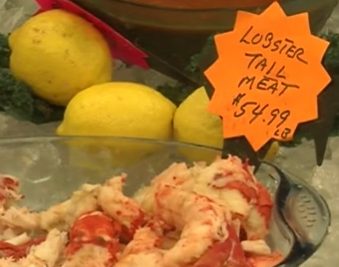 It was tough cold weather season for local fish markets, but finally lobster prices are starting to drop. Schermerhorn’s Seafood in Holyoke has been in business for more than 100 years. They told 22News they’ve never seen lobster prices this high for this long. Low demand driven by high prices and low supply driven by cold fishing waters. Schermerhorn’s said this coming week, the lobster beds should open up and prices should drop. Video, read the story here 10:40
It was tough cold weather season for local fish markets, but finally lobster prices are starting to drop. Schermerhorn’s Seafood in Holyoke has been in business for more than 100 years. They told 22News they’ve never seen lobster prices this high for this long. Low demand driven by high prices and low supply driven by cold fishing waters. Schermerhorn’s said this coming week, the lobster beds should open up and prices should drop. Video, read the story here 10:40
Arron Banks to launch pirate radio station off Clacton coast if he becomes UKIP candidate
 Millionaire businessman Arron Banks will start his own pirate radio station off the Clacton coast to help become the Essex town’s MP if he is selected as the UKIP candidate. Mr Banks, who caused controversy this week by admitting he knows nothing about the town, would use the pirate radio station, based in a fishing trawler, to help his election campaign. DJs would include former UKIP leader Nigel Farage, who now hosts a nightly LBC radio talk show, and former BBC Radio One presenter Mike Read. The details have been confirmed by Andy Wigmore, a spokesman for Mr Banks. In a statement issued to this newspaper, Mr Wigmore, a former DJ himself who would also be one of the station’s presenters, said: “We have been given a trawler by fishermen campaigning for fishing rights after Brexit. click here to continue reading the story 08:48
Millionaire businessman Arron Banks will start his own pirate radio station off the Clacton coast to help become the Essex town’s MP if he is selected as the UKIP candidate. Mr Banks, who caused controversy this week by admitting he knows nothing about the town, would use the pirate radio station, based in a fishing trawler, to help his election campaign. DJs would include former UKIP leader Nigel Farage, who now hosts a nightly LBC radio talk show, and former BBC Radio One presenter Mike Read. The details have been confirmed by Andy Wigmore, a spokesman for Mr Banks. In a statement issued to this newspaper, Mr Wigmore, a former DJ himself who would also be one of the station’s presenters, said: “We have been given a trawler by fishermen campaigning for fishing rights after Brexit. click here to continue reading the story 08:48
A Response – Speak plain English: Scientists can do a better job talking to fishermen
 I have just read your recent article by Brett Favaro, director of the Fisheries Sciences at Memorial University’s Fisheries and Marine Institute. “Speak plain English, Scientists can do a better job talking to fishermen, CBC News”. It mirrors what the scientists at the Northeast Science Center at Woodshole have concluded. They are hiring someone to do exactly that, translate between the scientists and the fishermen. I can’t believe that so many brilliant scientists could be so very “intellectually challenged” and arrogant.
I have just read your recent article by Brett Favaro, director of the Fisheries Sciences at Memorial University’s Fisheries and Marine Institute. “Speak plain English, Scientists can do a better job talking to fishermen, CBC News”. It mirrors what the scientists at the Northeast Science Center at Woodshole have concluded. They are hiring someone to do exactly that, translate between the scientists and the fishermen. I can’t believe that so many brilliant scientists could be so very “intellectually challenged” and arrogant.
I have spent my entire adult life fluctuating between fishing and science. My husband is a full time commercial fisherman and my youngest son is a PhD bio mathematician. They understand each other perfectly well. My son fished with his father from the age of 12. He understands fishing and how to listen and how to explain science.
In my opinion the problem is not that the fishermen do not understand the scientists. It is that the scientists no longer understand fishing. The program that you need to add to the curriculum is a year on the back deck learning the ins and outs of actual fishing. How to garner the best data possible from a working fishing vessel. What we have lost is the ability of the scientist to really listen to the fishermen and value their observations.
We should take a lesson from the renown scientist, Henry Bigelow, who spent most of his working career on the back deck of fishing vessels and paying fishermen for their knowledge. Listening to their observations and carefully cataloging them.
Ellen Goethel
Biologist/Owner Explore the Ocean World,LLC
Hampton, NH USA 19:35
New York Aquarium claims fishing groups distorted stance on Hudson Canyon National Marine Sanctuary
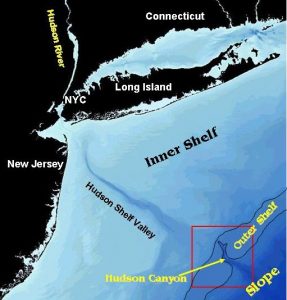 I am writing to correct the mischaracterization of the position and intentions of the Wildlife Conservation Society and its New York Aquarium regarding a proposed Hudson Canyon National Marine Sanctuary as reported in the Press. Contrary to the comments by Garden State Seafood Association Executive Director Greg DiDomenico (April 7 click here) and Recreational Fishing Alliance Executive Director Jim Donofrio (April 17 click here), WCS has always held that fishing in the proposed sanctuary should continue and that management authority should remain under the purview of the Mid-Atlantic Fishery Management Council and other existing fisheries authorities. We remain committed to this position and to addressing the concerns of the fishing community. In addition to affirming our support for continued fishing in Hudson Canyon, we have also argued that there are pressing habitat threats that a sanctuary status would address. click here to read the story 18:02
I am writing to correct the mischaracterization of the position and intentions of the Wildlife Conservation Society and its New York Aquarium regarding a proposed Hudson Canyon National Marine Sanctuary as reported in the Press. Contrary to the comments by Garden State Seafood Association Executive Director Greg DiDomenico (April 7 click here) and Recreational Fishing Alliance Executive Director Jim Donofrio (April 17 click here), WCS has always held that fishing in the proposed sanctuary should continue and that management authority should remain under the purview of the Mid-Atlantic Fishery Management Council and other existing fisheries authorities. We remain committed to this position and to addressing the concerns of the fishing community. In addition to affirming our support for continued fishing in Hudson Canyon, we have also argued that there are pressing habitat threats that a sanctuary status would address. click here to read the story 18:02
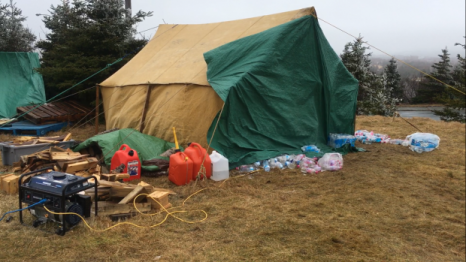
Day 10; Hunger Strike of Canadian Fisherman Richard Gillett – ‘Richard is very, very weak’
As Richard Gillett hits Day 10 of his hunger strike outside the Fisheries and Oceans building in St. John’s, his father wants him to stop it. His father, John Gillett, was standing outside in the misty rain on Saturday, with about 20 other protesters. “Richard is not doing well today. Richard is very, very weak,” said John Gillett. But, said John Gillett, somebody — “unfortunately, it’s my son” — has to stick up for the Newfoundland fishery. “This is a fish harvester who’s sick of kicking the can down the road and being bullied by the government, by DFO, and he’s going to be bullied out of the fishery just like a good many more people are.” (he’s right, you know. Set up to fail from poor fishery management.) click here to read the story 16:57
Debate simmers over Atlantic oil, gas exploration
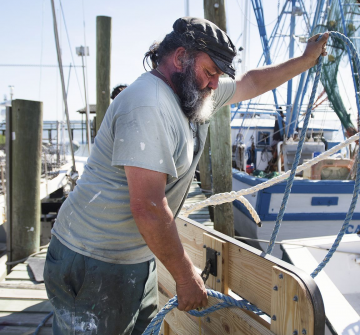 On this dock, where captains and first mates are freshening their boats with coats of white paint and rigging up new shrimp trawling gear to take to springtime Atlantic waters, the debate over drilling for oil in East Coast waters divides colleagues and, occasionally, families. Much of Capt. Wayne Magwood’s pro-offshore drilling stance comes down to a pocketbook issue. Burning through 1,000 gallons of diesel a week in his boat Winds of Fortune is manageable with low diesel costs, but past high fuel prices have made the economics of shrimping nearly impossible. “I’m tired of paying $4 a gallon. I’d like to pay $2 a gallon,” the 64-year-old Magwood said. “We don’t want to be dependent on foreign oil. We can’t get it when we need it. I think it’s good for the local economy. Environmentalists are doing a good job of regulating it and they’ve done a good job in the Gulf.”,, But to many on South Carolina’s coast, good money isn’t about oil. It’s about a way of life, attractive to locals and visitors alike. click here to read this big article. 13:29
On this dock, where captains and first mates are freshening their boats with coats of white paint and rigging up new shrimp trawling gear to take to springtime Atlantic waters, the debate over drilling for oil in East Coast waters divides colleagues and, occasionally, families. Much of Capt. Wayne Magwood’s pro-offshore drilling stance comes down to a pocketbook issue. Burning through 1,000 gallons of diesel a week in his boat Winds of Fortune is manageable with low diesel costs, but past high fuel prices have made the economics of shrimping nearly impossible. “I’m tired of paying $4 a gallon. I’d like to pay $2 a gallon,” the 64-year-old Magwood said. “We don’t want to be dependent on foreign oil. We can’t get it when we need it. I think it’s good for the local economy. Environmentalists are doing a good job of regulating it and they’ve done a good job in the Gulf.”,, But to many on South Carolina’s coast, good money isn’t about oil. It’s about a way of life, attractive to locals and visitors alike. click here to read this big article. 13:29
Downeast fishermen use old trick to battle higher bait prices
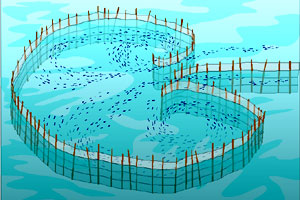 Two Washington County fishermen plan to invest in an ancient technology to combat a new problem — namely, the high cost of lobster bait. The Quoddy Tides reported that the fishermen will borrow pile-driving equipment to start creating a weir fishing system, the first used in that area in 15 years. Lobster bait, primarily herring, is selling for as much as $90 for a “tote” unit. The high costs last summer reportedly drove Maine lobster fishermen to start buying porgies from as far away as New Jersey. click here to read the story 11:53
Two Washington County fishermen plan to invest in an ancient technology to combat a new problem — namely, the high cost of lobster bait. The Quoddy Tides reported that the fishermen will borrow pile-driving equipment to start creating a weir fishing system, the first used in that area in 15 years. Lobster bait, primarily herring, is selling for as much as $90 for a “tote” unit. The high costs last summer reportedly drove Maine lobster fishermen to start buying porgies from as far away as New Jersey. click here to read the story 11:53
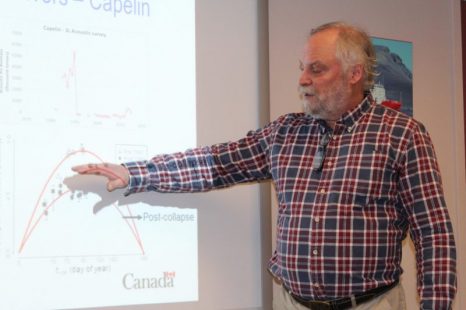
Speaking of Science, DFO says trust the science!
In the midst of ongoing protests outside of the Department of Fisheries and Oceans in St. John’s Friday, several DFO staff briefed reporters on fisheries science and the approach to resource management. At the Canadian Coast Guard building on Southside Road, they walked through an overview of ongoing scientific study and management work specific to Newfoundland and Labrador. The presentations spoke to the extent and effect of ecosystem changes, including the recent and painful quota cuts to both northern shrimp and crab. A biomathematician and employee for more than 30 years with DFO, Dr. Pierre Pepin spoke to the department’s seasonal ocean climate monitoring and trawl surveys, among other work. He said the science being conducted in the region is robust, and the reports and advice coming from DFO scientists can be trusted as a fundamental source of information. click here to read the story 09:46
Speak plain English: Scientists can do better job talking to fishermen
 Fishermen and DFO scientists may never stand on the same side when it comes to fish quotas and stocks, but the gap can — and should — be bridged, according to an academic director at Memorial University’s Fisheries and Marine Institute. “The fact that there is so much controversy is indicative that communication is a necessary component … If we’re going to find a way forward, we’re going to have to keep talking,” said Brett Favaro, director of the Fisheries Sciences program. “I think this is a really difficult situation.”,, “What we want is the next generation of researchers to be literate in communicating their science, not just — as we say — within their ivory tower … but also be able to mobilize that knowledge and engage with people in conservation groups and industry, in government, to help make that research have a direct impact on the world.” Click here to read the story 09:32
Fishermen and DFO scientists may never stand on the same side when it comes to fish quotas and stocks, but the gap can — and should — be bridged, according to an academic director at Memorial University’s Fisheries and Marine Institute. “The fact that there is so much controversy is indicative that communication is a necessary component … If we’re going to find a way forward, we’re going to have to keep talking,” said Brett Favaro, director of the Fisheries Sciences program. “I think this is a really difficult situation.”,, “What we want is the next generation of researchers to be literate in communicating their science, not just — as we say — within their ivory tower … but also be able to mobilize that knowledge and engage with people in conservation groups and industry, in government, to help make that research have a direct impact on the world.” Click here to read the story 09:32
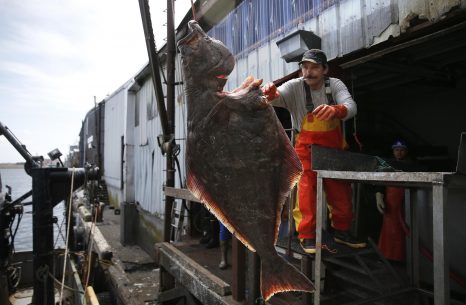
Loss of ‘Codfather’ permits could hurt New Bedford
By late morning just before Easter weekend, three fishing vessels lined up at the docks to unload their catch, and they all belonged to one man — the local mogul known as the “Codfather,” Carlos Rafael. “It’s a good haul,” a passing auction worker at the Whaling City Seafood Display Auction said under her breath, as crew members, some still in their orange waterproof bibs, unloaded the ice-packed fish. But now, Rafael’s recent conviction on federal charges that he cheated fishing regulations to boost his profits is putting his many vessels and permits up for grabs — potentially distributing them to ports along the New England coast. That would deliver an economic blow to New Bedford and the people who depend on the business created by Rafael’s fleet. If his permits are seized as expected, the National Oceanic and Atmospheric Administration, the regulatory agency known as NOAA, could reissue the permits to fishermen elsewhere in the region. “There are a lot more innocent people who could get punished by this,” said Jim Kendall, a former fisherman who runs New Bedford Seafood Consulting. click here to read the story 09:00
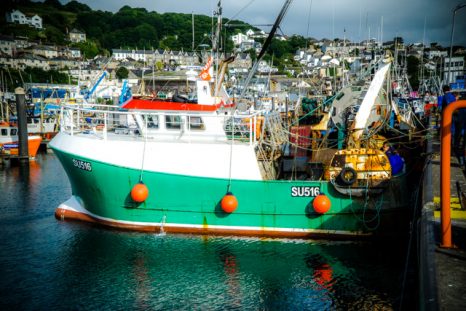
VMS – Fishermen living in a police state – makes the Stazi and Big Brother look benign!
Here’s an example of what has happened to the fishing industry and how closely monitored its operations have become – now, almost the entire fleet are policed remotely using a VMS (vessel Monitoring System) that tracks their every move. Fishermen have to pay for the privilege of being watched 24/7 and maintain the equipment directly from what comes out out of the cod-end – which they are happy to do – but, if for any reason the system fails, they are immediately contacted by the MMO who insist that they report their position manually every 4 hours and return to port immediately to fix the problem – when they will be detained until they have done so!…This is exactly what happened to the Spirited Lady III yesterday click here to read the story 08:09
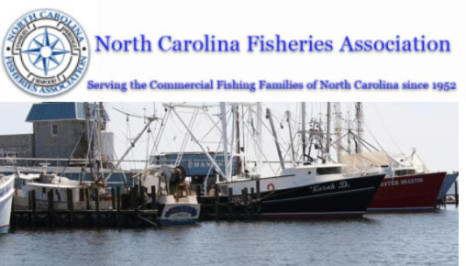
North Carolina Fisheries Association Weekly Update for April 21, 2017
Click here to read the Weekly Update, to read all the updates, Click here 16:57
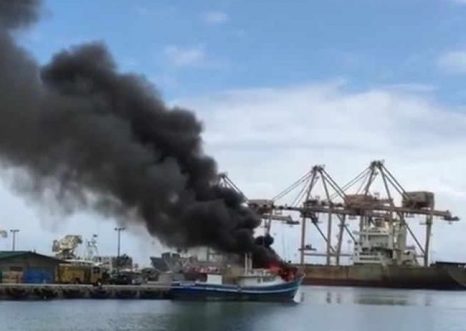
Crews battle 2-alarm boat fire at Pier 38 in Honolulu
Firefighters were called to Pier 38 at Honolulu Harbor Thursday afternoon for a report of a boat fire. The first call for the 2-alarm fire was shortly before 2 p.m. Fire officials say smoke and flames were coming from the forward section of the 79-foot-long fishing vessel “Elizabeth.” The Coast Guard is assisting with the fire. No injuries were reported. click here for photo’s and video 15:35

Day 9 – Canadian Fisherman Richard Gillett continues hunger strike protest after call from minister
Richard Gillett is weak now and growing weaker by the hour. The once burly fisherman from Twillingate, N.L., known for his three seasons on the reality TV show “Cold Water Cowboys,” has lived in a tent on a water-only diet since April 13 on the grounds of the federal Fisheries and Oceans building in St. John’s. He spoke to reporters early Friday from his cot, his eyes glazed. His wife and daughter, one of his three teenaged children, were by his side as he apologized for mental lapses on Day 9 of a hunger strike to protest what he says is dire mismanagement of fish stocks. “It takes every bit of energy now just to talk.” Gillett, 45, said he has no plans to quit despite a phone call Thursday night from Fisheries Minister Dominic LeBlanc. “He didn’t offer me anything that was solid other than a meeting in two to three weeks’ time. And that’s certainly not enough to warrant me, after my hunger strike, to get off this hill. That’s not what I’m asking.” click here to read the story 14:52:17
Richard Gillett supporters block DFO exit as workers try to leave – click here to read the story 14:58
U.S. First Circuit Court of Appeals Upholds Decision on Reg That Will Put 60 Percent of New England Ground Fishermen Out of Business
 On Friday, the U.S. First Circuit Court of Appeals upheld the District Court’s ruling last summer that a lawsuit filed by Cause of Action Institute (CoA Institute) on behalf of Plaintiffs David Goethel and Northeast Fishery Sector 13 against the U.S. Department of Commerce should be dismissed. In its opinion, the Court found that the fishermen’s suit was untimely and therefore did not consider the Plaintiff’s legal arguments that requiring fishermen to pay for monitors is against the law. However, in a rare move, the judges highlighted the devastating economic impacts of the regulation in question, and urged Congress to clarify the law and who should pay for the at-sea monitors. “I am disappointed by the decision,” Goethel said. “But I’m hopeful that Congress will heed the Court’s direction and clarify the law. It is the government’s obligation to pay for these at-sea monitors.,, Northeast Fishery Sector 13 Manager John Haran said, “I’m disappointed that timeliness of the case was the Court’s deciding factor and not the merits of our arguments. The fishermen in my sector can’t sustain this industry funding requirement and many will be put out of business if this mandate remains in place.” click here to read the story 14:37
On Friday, the U.S. First Circuit Court of Appeals upheld the District Court’s ruling last summer that a lawsuit filed by Cause of Action Institute (CoA Institute) on behalf of Plaintiffs David Goethel and Northeast Fishery Sector 13 against the U.S. Department of Commerce should be dismissed. In its opinion, the Court found that the fishermen’s suit was untimely and therefore did not consider the Plaintiff’s legal arguments that requiring fishermen to pay for monitors is against the law. However, in a rare move, the judges highlighted the devastating economic impacts of the regulation in question, and urged Congress to clarify the law and who should pay for the at-sea monitors. “I am disappointed by the decision,” Goethel said. “But I’m hopeful that Congress will heed the Court’s direction and clarify the law. It is the government’s obligation to pay for these at-sea monitors.,, Northeast Fishery Sector 13 Manager John Haran said, “I’m disappointed that timeliness of the case was the Court’s deciding factor and not the merits of our arguments. The fishermen in my sector can’t sustain this industry funding requirement and many will be put out of business if this mandate remains in place.” click here to read the story 14:37
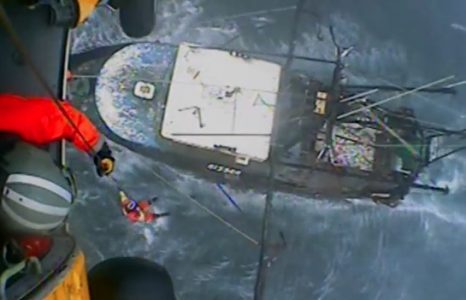
UPDATED: Coast Guard conducts medevac 65 miles south of Montauk, N.Y.
A Coast Guard Jayhawk helicopter crew medically evacuated a 47-year-old man 65 miles south of Montauk, N.Y., Friday. At 8:25 a.m., the fishing vessel Braedon Michael notified Coast Guard Station Montauk, who then relayed to Sector Long Island Sound, of a crewmember aboard who was experiencing flu like symptoms and was in and out of consciousness. An MH-60 Jayhawk helicopter launched from Air Station Cape Cod, Massachusetts, at 9:50 a.m., and arrived on scene approximately an hour later. The crewmember was safely hoisted from the deck of the Braedon Michael and transported to Air Station Cape Cod, where local Emergency Medical Services were waiting. USCG Video click here to watch 14:20
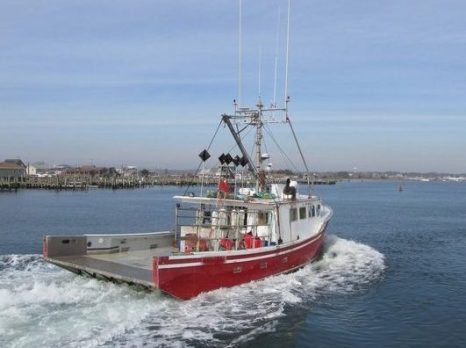
Catch Shares? – Researchers Fear Industrialization of Maine Lobster Fleet
Unlike most fisheries in the world, the lobster industry is actually experiencing an unprecedented boom despite centuries of sustained harvesting. Last year, the lobster catch was a record 130 million pounds, marking the fifth straight year the annual catch went over 120 million pounds, and over six times more than the long-term average for the state. The recent lobster boom, according to the Gulf of Maine Research Institute, is likely primarily due to warmer ocean temperatures as younger lobsters are reaching sexual maturity faster in warmer waters. But it’s also because, unlike the ground fishery, the state long ago took a proactive approach to conserving the resource. “There are some interesting differences between those two fisheries in terms of the regulations we put in place very early on in the lobster fishery,” said fisheries researcher Patrick Shepard at the Penobscot Marine Museum’s “Our Evolving Fisheries History Conference” in Belfast on April 8, “but there are also some interesting parallels to what might be happening as far as technological advances.” click here to read the article 13:49
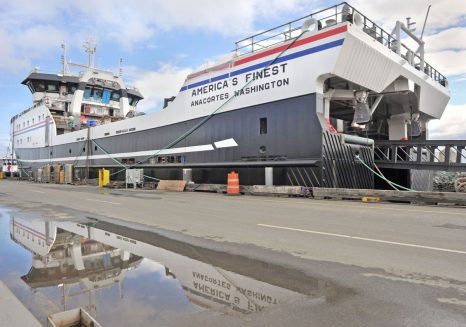
Dakota Creek Industries working on state-of-the-art fishing vessel
U.S. Rep. Rick Larsen met Thursday morning at Dakota Creek Industries with shipbuilders and commercial fishermen eager to show off a new, fuel-efficient fishing vessel. The ship, America’s Finest, is bigger, safer, more efficient and pollutes less than existing vessels, according to Fishermen’s Finest, the ship’s owner and operator. The company says the ship will have the smallest carbon footprint per ton of fish of any fishing vessel in the Bering Sea. The 262-foot-long ship is like a floating city, with its own fish processing factory, power plant and sewage treatment facility, said Kristian Uri, Fishermen’s Finest general manager. click here to view additional photo’s and read the story 11:01
Judge says Butt Out! Environmentalists Can’t Help Defend Fishing Rules
 Three environmental groups cannot join the U.S. government to defend against a challenge to an Obama administration rule requiring seafood companies to report the origin of the fish they sell, a federal judge ruled (click to open). The National Resources Defense Council, the Center for Biological Diversity and Oceana asked the court on March 7 to join the government in defending a suit from a group of fishing companies challenging the seafood traceability rule, which requires companies to disclose on a government form the vessel or collection point of origin for their fish. The companies say the rule will make seafood more expensive. The environmentalists say it is critical to protecting fish populations from illegal fishing. The environmentalists made specific arguments in support of the rule, telling U.S. District Judge Amit Mehta that reversal would affect their daily lives. Lol! affect their daily lives? What lives! click here to read the story 10:07
Three environmental groups cannot join the U.S. government to defend against a challenge to an Obama administration rule requiring seafood companies to report the origin of the fish they sell, a federal judge ruled (click to open). The National Resources Defense Council, the Center for Biological Diversity and Oceana asked the court on March 7 to join the government in defending a suit from a group of fishing companies challenging the seafood traceability rule, which requires companies to disclose on a government form the vessel or collection point of origin for their fish. The companies say the rule will make seafood more expensive. The environmentalists say it is critical to protecting fish populations from illegal fishing. The environmentalists made specific arguments in support of the rule, telling U.S. District Judge Amit Mehta that reversal would affect their daily lives. Lol! affect their daily lives? What lives! click here to read the story 10:07
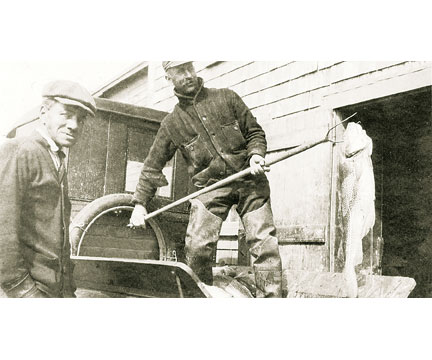
Could the Gulf of Maine’s Ground Fishery Rebound?
“The English had discovered living resources that would attract, shape, and sustain the communities of the coast of Maine for the next four centuries,” wrote journalist and historian Colin Woodard of the bounty that once existed in the Gulf of Maine in the 17th century in his book “The Lobster Coast.” “Early explorers were flabbergasted by the largesse of the Gulf of Maine, a semienclosed sea stretching from Cape Cod to Nova Scotia. They saw great pods of whales, acres of thrashing tuna, vast schools of salmon, herring and mackerel, clouds of puffins and terns, shoals of mussels and oysters, vast mudlfats infested with fat clams, cod and haddock biting at the hook, and enormous lobsters foraging in the rockweed. The waters off England and France seemed barren by comparison.” As Woodard noted, the geology and climate of the Gulf of the Maine with its 7,500-mile coastline made the area perfectly suited for a thriving fishery — a “fertile oasis in a world ocean that is, ecologically speaking, largely desert.” click here to read the story 09:27
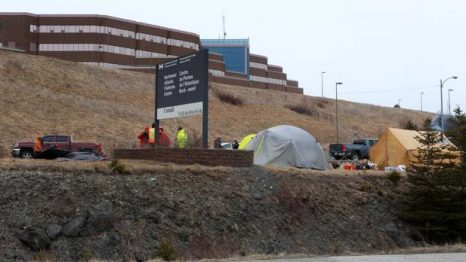
Newfoundland hunger strike Fisherman Richard Gillett speaks with federal fisheries minister
A spokeswoman for Dominic LeBlanc said the fisheries minister spoke with Richard Gillett for more than an hour on Thursday evening, covering a broad range of issues. Laura Gareau said the two agreed to speak again, adding that LeBlanc expressed concern for Gillett’s health, and urged him to make his health and family a priority. About three dozen protesters went to the federal fisheries office in St. John’s, N.L., on Thursday morning to show support for Gillett, who has been on a hunger strike since last Thursday. Gareau said LeBlanc also expressed concern that the protest prevented nearly 400 Department of Fisheries and Oceans employees from getting to work, interrupting their ability to serve fish harvesters across Newfoundland and Labrador. click here to read the story 00:50
Snow crab prices could be clawed back
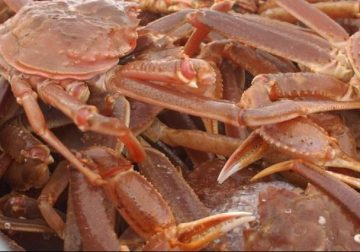 Halfway around the world there’s an uneasiness that may land this year’s Newfoundland snow crab industry in troubled waters. While the announced increase in price between the province’s harvesters and processors this year appears to have somewhat offset concerns about a drastic drop in Newfoundland snow crab quotas, key Japanese buyers remain uncertain about paying a high price through the season. The minimum price per pound for snow crab this year for harvesters was set at $4.39 — the highest price ever in this province — by the Standing Fish Price Setting Panel, which chose the harvesters’ proposed price over the processors’ offer of $4.10. John Sackton, a longtime North American seafood market analyst and president and publisher of SeafoodNews.com, said Japanese buyers find themselves in an uneasy situation. He said their normal buying process — in which the buyers like to work on a single-established price — has been disrupted. click here to read the story 22:35
Halfway around the world there’s an uneasiness that may land this year’s Newfoundland snow crab industry in troubled waters. While the announced increase in price between the province’s harvesters and processors this year appears to have somewhat offset concerns about a drastic drop in Newfoundland snow crab quotas, key Japanese buyers remain uncertain about paying a high price through the season. The minimum price per pound for snow crab this year for harvesters was set at $4.39 — the highest price ever in this province — by the Standing Fish Price Setting Panel, which chose the harvesters’ proposed price over the processors’ offer of $4.10. John Sackton, a longtime North American seafood market analyst and president and publisher of SeafoodNews.com, said Japanese buyers find themselves in an uneasy situation. He said their normal buying process — in which the buyers like to work on a single-established price — has been disrupted. click here to read the story 22:35
NOAA Fisheries Approves Amendment 18 to Address Fleet Consolidation in Groundfish Fishery
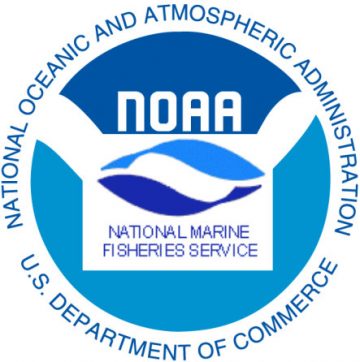 NOAA Fisheries has approved Amendment 18 to the Northeast Multispecies Fishery Management Plan. The Amendment establishes permit accumulation limits to minimize fleet consolidation in the groundfish fishery. Amendment 18 limits the number of permits and annual groundfish allocation that an entity could hold. Also, to increase fishing opportunities and promote fleet diversity, Amendment 18 increases flexibility for fishermen on limited-access handgear vessels. Read the final rule as published in the Federal Register, and the permit holder letter posted on our website.Questions? Contact Jennifer Goebel at 978-281-9175 or [email protected]
NOAA Fisheries has approved Amendment 18 to the Northeast Multispecies Fishery Management Plan. The Amendment establishes permit accumulation limits to minimize fleet consolidation in the groundfish fishery. Amendment 18 limits the number of permits and annual groundfish allocation that an entity could hold. Also, to increase fishing opportunities and promote fleet diversity, Amendment 18 increases flexibility for fishermen on limited-access handgear vessels. Read the final rule as published in the Federal Register, and the permit holder letter posted on our website.Questions? Contact Jennifer Goebel at 978-281-9175 or [email protected]
When it comes to in the Atlantic east of Montauk, the Fishing Industry must be considered
 Many in the commercial fishing industry are frustrated with the pace of planning a planned wind farm in the Atlantic east of Montauk. The project, they say, will hurt their ability to make a living and they are feeling left behind by public officials and by public sentiment, which appears largely supportive. Aware of these concerns, Deepwater Wind, the company planning the turbines, wants to hire a handful of local representatives to help smooth the waters. Balancing the needs of fishermen with the increasing call for renewable energy is a tough order. Seafood harvesters here have long expressed displeasure at what they see as excessive and unnecessary regulation. Now, with the industrialization of portions of their fishing grounds, they fear a slippery slope in which productive areas are put out of reach. Their concerns are important and have to be weighed carefully. click here to read the Op-Ed 17:14
Many in the commercial fishing industry are frustrated with the pace of planning a planned wind farm in the Atlantic east of Montauk. The project, they say, will hurt their ability to make a living and they are feeling left behind by public officials and by public sentiment, which appears largely supportive. Aware of these concerns, Deepwater Wind, the company planning the turbines, wants to hire a handful of local representatives to help smooth the waters. Balancing the needs of fishermen with the increasing call for renewable energy is a tough order. Seafood harvesters here have long expressed displeasure at what they see as excessive and unnecessary regulation. Now, with the industrialization of portions of their fishing grounds, they fear a slippery slope in which productive areas are put out of reach. Their concerns are important and have to be weighed carefully. click here to read the Op-Ed 17:14
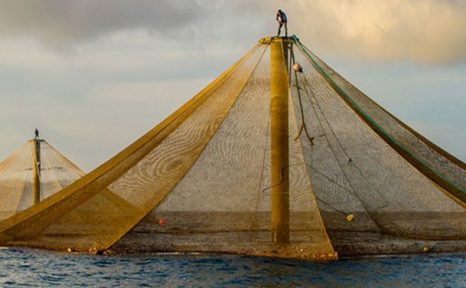
Is the United States ready for offshore aquaculture?
Harlon Pearce walks muck-booted past processors gutting wild drum and red snapper to showcase a half-full new 5,000-square-foot (500-square-meter) freezer he hopes will someday house a fresh boom of marine fish. Harlon’s LA Fish sits just across the railroad tracks from the Louis Armstrong New Orleans International Airport, perfectly positioned to ship fish out of Louisiana. As president of the New Orleans–based Gulf Seafood Institute, seafood supplier Pearce is a big fish himself in these parts, connected to fishermen, federal agencies, restaurateurs and even the oil industry. He knows better than anyone that wild fisheries alone can’t supply U.S. consumers’ growing demand for fish. Which is why he’s doing his best to bring everyone to the table to achieve one goal: farming the Gulf of Mexico. click here to read the story 16:31
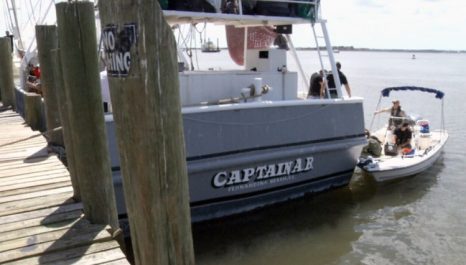
ICE searching shrimp boats docked at Mayport, Fernandina
A shrimping boat docked at Mayport and another at Fernandina Beach were searched Wednesday by Immigration and Customs Enforcement officers. The Jacksonville Sheriff’s Office dive team and at least one officer of the Florida Fish and Wildlife Conservation Commission were assisting in the Mayport search of the Mattie Fay at the dock of Safe Harbor Seafood, next to the U.S. Coast Guard Station. The Captain A.B. was the boat being searched in Fernandina. The two shrimping boats are owned by brothers, who had just returned from Key West after at least 20 days at sea. Leon Reid runs Mattie Fay and Ricky Armstrong runs Captain A.B. click here to read the story 13:37

Day 8: Richard Gillett hunger strike – Gillett joined by two-dozen supporters
As the eighth day Richard Gillett’s hunger strike began Thursday morning, he was joined by over two dozen of his fellow fish harvesters. While the demonstration was peaceful in nature, the protestors were stopping Department of Fisheries and Ocean Employees from entering the road leading the Northwest Atlantic Fisheries Centre. There were few vehicles to impede, however, as DFO management had already planned a delayed opening and decided just after 8:30 a.m. to keep the building closed until noon. RNC officers were briefly on the scene to speak with Gillett and his supporters. click here to read the story 11:44
‘It’s breaking my heart’: Richard Gillett’s father among fishermen supporting hunger striker – click to read the story and a short video 13:27
Lobster buyer gets his license yanked
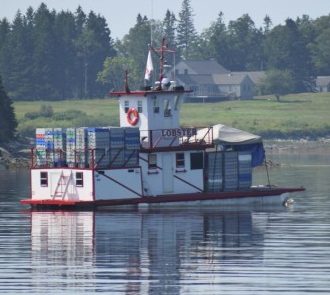 A hearing examiner has upheld the one-year suspension of the license of a lobster buyer accused of failing to report a portion of the purchases made off a barge based in Seal Cove in Tremont. In August, Maine Marine Patrol officers summonsed Donald Crabtree Sr. of Crabtree Seafood in Brewer on a charge of violating the Department of Marine Resources’ (DMR) reporting requirements, a civil violation. Crabtree appealed his suspension. A hearing examiner last week determined that the suspension is justified, according to Sgt. Troy Dow of the marine patrol. Crabtree began using the town-owned Seal Cove Wharf as a base for his lobster business in the spring of 2015. He was mooring his 45-foot barge there and used the facility’s ramp to load bait before motoring into Blue Hill Bay to sell bait to fishermen and buy lobsters from them. The day’s catch later was offloaded at the ramp. click here to read the story 11:16
A hearing examiner has upheld the one-year suspension of the license of a lobster buyer accused of failing to report a portion of the purchases made off a barge based in Seal Cove in Tremont. In August, Maine Marine Patrol officers summonsed Donald Crabtree Sr. of Crabtree Seafood in Brewer on a charge of violating the Department of Marine Resources’ (DMR) reporting requirements, a civil violation. Crabtree appealed his suspension. A hearing examiner last week determined that the suspension is justified, according to Sgt. Troy Dow of the marine patrol. Crabtree began using the town-owned Seal Cove Wharf as a base for his lobster business in the spring of 2015. He was mooring his 45-foot barge there and used the facility’s ramp to load bait before motoring into Blue Hill Bay to sell bait to fishermen and buy lobsters from them. The day’s catch later was offloaded at the ramp. click here to read the story 11:16






 Ryan Cleary says the Department of Fisheries and Oceans (DFO) and the Fish, Food and Allied Workers (FFAW) union are killing Richard Gillett with politics. “This guy is a rock, but he’s hurting now and they’re playing with his life,” the Federation of Independent Sea Harvesters of Newfoundland and Labrador president said of the organization’s vice-president, who is now eight days into a hunger strike while camped outside the Northwest Atlantic Fisheries Centre in St. John’s. Cleary was responding to a news release from the FFAW that he claims takes credit for the federal government’s decision to conduct a full assessment on northern cod stocks on an annual basis. (Ten yearold Lucas Wilkinson made the point it was important to show solidarity with Richard Gillett.
Ryan Cleary says the Department of Fisheries and Oceans (DFO) and the Fish, Food and Allied Workers (FFAW) union are killing Richard Gillett with politics. “This guy is a rock, but he’s hurting now and they’re playing with his life,” the Federation of Independent Sea Harvesters of Newfoundland and Labrador president said of the organization’s vice-president, who is now eight days into a hunger strike while camped outside the Northwest Atlantic Fisheries Centre in St. John’s. Cleary was responding to a news release from the FFAW that he claims takes credit for the federal government’s decision to conduct a full assessment on northern cod stocks on an annual basis. (Ten yearold Lucas Wilkinson made the point it was important to show solidarity with Richard Gillett. 


























